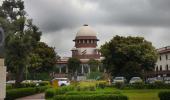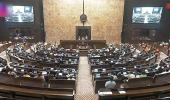The Archaeological Survey of India informed the JPC that 280 protected monuments have been listed as Waqf properties.

Safdarjung's Tomb, Purana Qila, Humayun's Tomb and Qutub Minar in Delhi are among the more than 200 protected monuments that Waqf Boards claim to be their properties, according to a list provided by the joint parliamentary committee on the Waqf (Amendment) Bill, 2024.
The list also includes the tomb of Tipu Sultan, the grave of Aurangzeb's wife and the Gulbarga Fort in Karnataka.
The Archaeological Survey of India informed the JPC, headed by Bharatiya Janata Party MP Jagdambika Pal, that 280 protected monuments have been listed as Waqf properties.
The report, tabled in Parliament in February, however, had an indicative list of 254 such protected monuments.
The ministry of housing and urban development told the JPC that 108 properties under the land and development office, 130 properties under the Delhi Development Authority, and 123 properties in the public domain were declared Waqf properties and brought into litigation as of September 2024.
A total of 58,898 properties were under encroachment according to the Waqf Assets Management System of India (WAMSI) portal that month.
There were 5,220 cases relating to encroachment and 1,340 related to alienation, out of 19,207 cases in tribunals and other courts that month.
The number of such cases has remained the same till February 28, according to the latest data on the WAMSI portal.
Alienation, in this context, means the act of transferring, selling, gifting, mortgaging, or disposing of a piece of land designated 'Waqf property' without authorisation from the Waqf board.
The JPC says that one of the reasons for these cases could be the ambiguous ownership or title of Waqf properties, often declared on the basis of long-term use, without deeds or adequate documents.
Most encroached properties -- 42,684 -- relate to the Punjab Waqf Board. While most encroachment cases, numbering 2,461, relate to the Telangana State Waqf Board.
The JPC recommended that cases relating to existing Waqf properties already registered as 'Waqf by user' should not be reopened and should remain Waqf properties even if there is no Waqf deed.
This should, however, be subject to the condition that the property is not disputed or is not government property.
Feature Presentation: Ashish Narsale/Rediff.com












 © 2025
© 2025